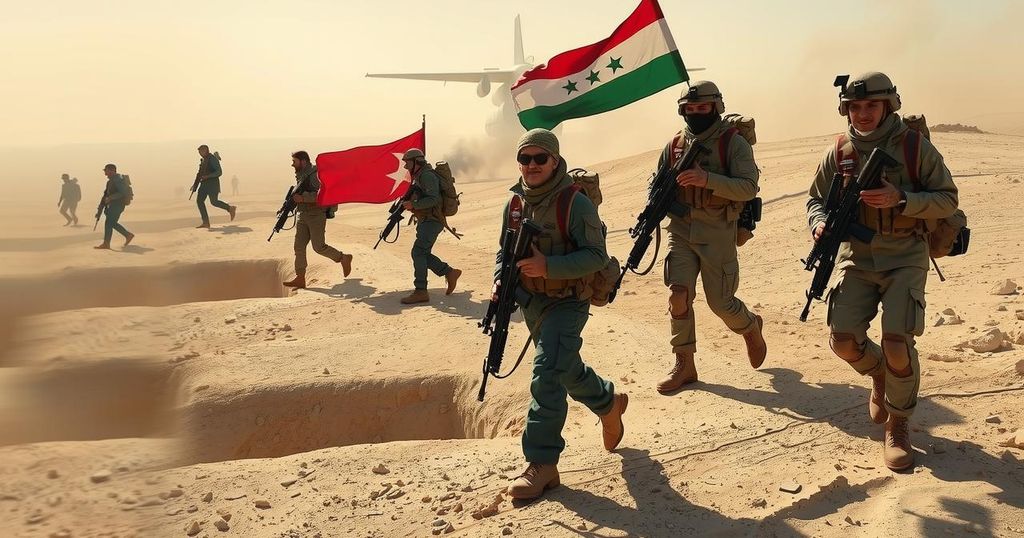World news
’ EL ALZAYAT, AMERICA, ASIA, ASSAD, BASHA, BASHAR AL -, DEMOCRATIC FORCES, EUROPE/ASIA, FIGHTER JETS, FOREIGN POLICY, HAYAT TAHRIR AL - SHAM, JIHADIST GROUPS, KURDISTAN WORKERS ’ PARTY, LARA JAKES, MIDDLE EAST, MILITARY, NICHOLAS HERAS, NORTH AMERICA, P. K. K, REC, RECEP TAYYIP ERDOGAN, STATE, SYRIA, SYRIAN CONFLICT, SYRIAN NATIONAL ARMY, TURKEY, UNITED STATES, WA, WAR
Elena Martinez
0 Comments
Kurdish Allies of the U.S. Face Rising Threats in Post-Civil War Syria
Syria’s Kurds, once vital allies of the U.S. against ISIS, now face threats from Turkey-backed factions, as political shifts in Syria heighten their vulnerability. Turkey perceives the Kurds as adversaries linked to the PKK, creating a precarious situation for Kurdish forces, especially in contested regions such as Kobani. U.S. support is critical for the Kurds to navigate these challenges and prevent a resurgence of extremism.
The conclusion of Syria’s prolonged civil war has not brought security to the Kurdish minority, which remains under threat from Turkish forces. Having allied with the United States against the Islamic State, the Kurdish-led Syrian Democratic Forces now face increased aggression from Turkey, which perceives them as an enemy linked to the separatist PKK. With Turkey’s current political leverage in the region heightened due to shifts in Syrian leadership, Kurdish positions appear precarious as they confront Turkish-backed opposition, potentially leading to regional instability and a resurgence of extremist groups.
In recent developments, President Erdogan’s backing of anti-Assad factions signals an ambitious agenda to target Kurdish fighters, which may escalate military confrontations. This power dynamic is exacerbated by the uncertainty of U.S. support, as American officials strive to negotiate a ceasefire amid growing hostilities. The strategic withdrawal of Kurdish forces from contested areas poses significant risks, possibly leading to further territorial loss and diminished autonomy ambitions. Notably, U.S. involvement remains pivotal, with officials emphasizing the necessity of Kurdish contributions to combatting ISIS. The potential for conflict looms large, especially around key geographic and symbolic locations such as Kobani, where Kurdish heritage and resistance align against Turkish incursions.
The article centers on the evolving geopolitical landscape in Syria, particularly the position of Kurdish forces who had partnered with the United States against ISIS. Despite their efforts and sacrifices over the years, the shifting dynamics following the Syrian civil war, combined with Turkey’s assertive stance against the Kurds, place these fighters in a vulnerable position. As Turkey strengthens its influence in the region post-civil war, fears grow regarding military aggression that could lead to significant territorial losses for the Kurds. American diplomatic support is highlighted as crucial, while the risks of renewed conflict hang in the balance.
In summary, Syria’s Kurdish allies find themselves in a precarious position amid the aftermath of the civil war. With Turkish aggression on the rise and the dynamics of power in flux, the Kurdish-led forces are at risk of losing critical territory and facing increased hostilities. U.S. involvement remains essential in negotiating peace, yet the outcome remains uncertain as regional tensions threaten to ignite further conflict. The situation underscores the fragile balance of power in Syria and the need for strategic international engagement.
Original Source: www.nytimes.com




Post Comment